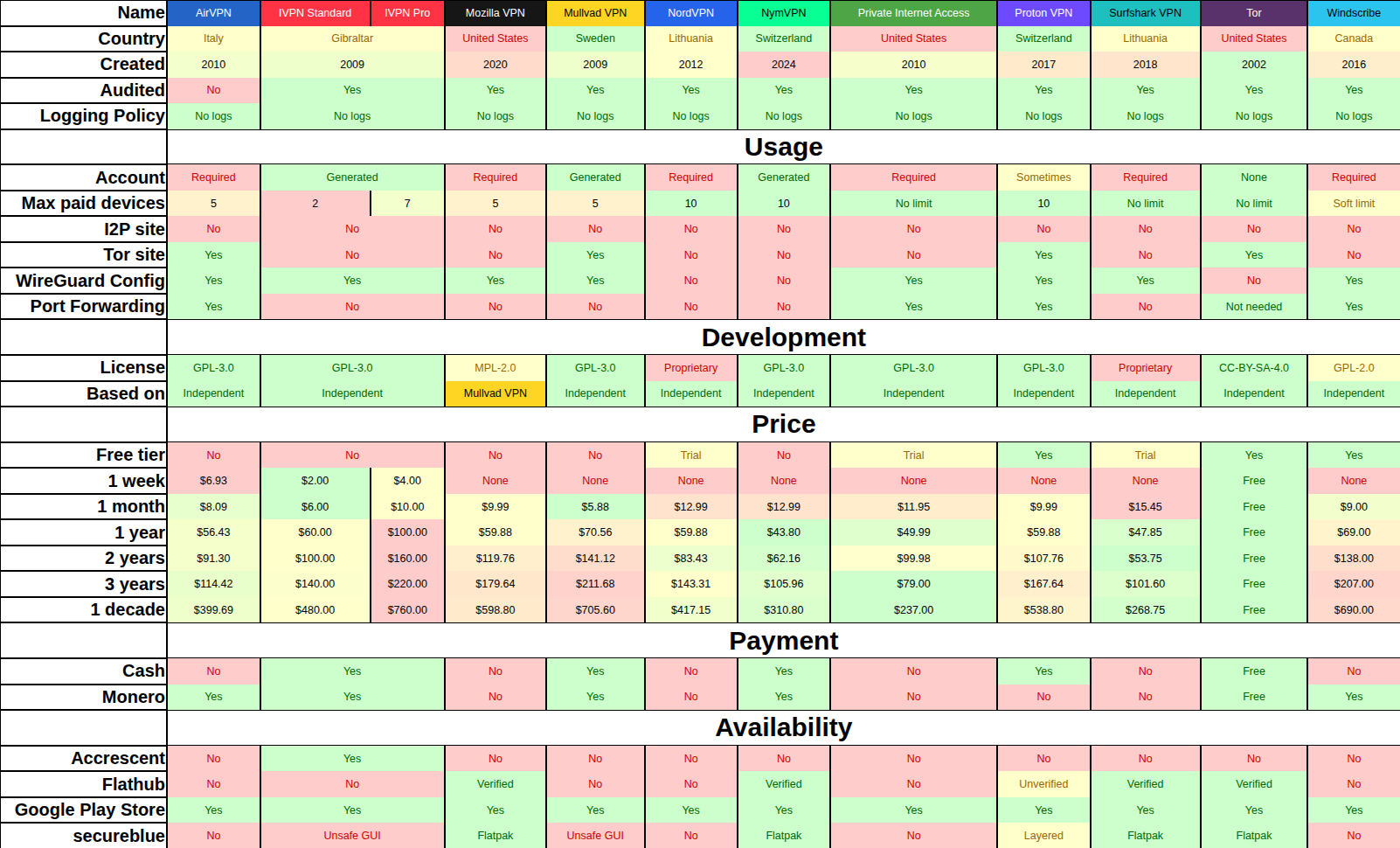- cross-posted to:
- privacy@lemmy.ml
- cross-posted to:
- privacy@lemmy.ml
cross-posted from: https://lemmy.ml/post/37366040
After making a post about comparing VPN providers, I received a lot of requested feedback. I’ve implemented most of the ideas I received.
Providers
- AirVPN
- IVPN
- Mozilla VPN
- Mullvad VPN
- NordVPN
- NymVPN
- Private Internet Access (abbreviated PIA)
- Proton VPN
- Surfshark VPN
- Tor (technically not a VPN)
- Windscribe
Notes
- I’m human. I make mistakes. I made multiple mistakes in my last post, and there may be some here. I’ve tried my best.
- Pricing is sometimes weird. For example, a 1 year plan for Private Internet Access is 37.19€ first year and then auto-renews annually at 46.73€. By the way, they misspelled “annually”. AirVPN has a 3 day pricing plan. For the instances when pricing is weird, I did what I felt was best on a case-by-case basis.
- Tor is not a VPN, but there are multiple apps that allow you to use it like a VPN. They’ve released an official Tor VPN app for Android, and there is a verified Flatpak called Carburetor which you can use to use Tor like a VPN on secureblue (Linux). It’s not unreasonable to add this to the list.
- Some projects use different licenses for different platforms. For example, NordVPN has an open source Linux client. However, to call NordVPN open source would be like calling a meat sandwich vegan because the bread is vegan.
- The age of a VPN isn’t a good indicator of how secure it is. There could be a trustworthy VPN that’s been around for 10 years but uses insecure, outdated code, and a new VPN that’s been around for 10 days but uses up-to-date, modern code.
- Some VPNs, like Surfshark VPN, operate in multiple countries. Legality may vary.
- All of the VPNs claim a “no log” policy, but there’s some I trust more than others to actually uphold that.
- Tor is special in the port forwarding category, because it depends on what you’re using port forwarding for. In some cases, Tor doesn’t need port forwarding.
- Tor technically doesn’t have a WireGuard profile, but you could (probably?) create one.
Takeaways
- If you don’t mind the speed cost, Tor is a really good option to protect your IP address.
- If you’re on a budget, NymVPN, Private Internet Access, and Surfshark VPN are generally the cheapest. If you’re paying month-by-month, Mullvad VPN still can’t be beat.
- If you want VPNs that go out of their way to collect as little information as possible, IVPN, Mullvad VPN, and NymVPN don’t require any personal information to use. And Tor, of course.
ODS file: https://files.catbox.moe/cly0o6.ods
The age of a VPN isn’t a good indicator of how secure it is.
So then delete the row. OP, you control the spreadsheet, right?
Also, heat map conditional formatting favoring free is a bad metric. Free VPNs steal data, and Tor isn’t a VPN, so this skews all the other paid options to seem negative.
So then delete the row. OP, you control the spreadsheet, right?
I can’t speak for others, but I personally appreciate the info anyway. Because I wouldn’t trust a VPN company that’s been around for like 3 months. And it allows you to judge a track record with context.
The age is useful when considering risk of enshitificarion. A well established and respected vpn has probably figured out how to run profitably, and will probably only go to shit after being sold out or a similar major internal upset, a 3 month old vpn may be offering below cost deals to undercut (or just catch up with) the market whilst the startup funding lasts, in which case they’ll have no choice but to start turning the screws once they have some customers
Sure, but this is a heat map. It’s only relative, not objective. If most of these were 3 months old, and one was only 2 months old, the 3 months would all be in the green.
Tor is not a VPN and the use case is not interchangeable
I believe that supposed to be whether you can get to their website to download clients / register / etc through TOR. Not that the VPN can access the TOR network.
If you’re going to be giving out advice, you should at least know that Mozilla VPN is rebranded Mullvad VPN. So most of the information on your chart should be exactly the same for both.
https://www.mozilla.org/en-US/products/vpn/features/
Scroll down to “Convenient,” then “More than 500 servers in 30+ countries,” and click on the link “See our list of servers,” which takes you to the Mullvad website server list here:
https://mullvad.net/en/servers
Unless something has changed, the VPN that Malwarebytes sells is also rebranded Mullvad.
In my opinion, if you’re going to include a VPN like PIA, you should also include who owns them (Kape Technologies - owner of multiple VPNs), and instruct people to do an internet search for “Kape Technologies malware.” I’m not saying don’t get PIA, but people should be able to at least make an informed decision:
“Kape Technologies, originally known as Crossrider, has a history of distributing malware through its ad injection platform before rebranding and focusing on VPN services. While it has since shifted its business model, concerns about its past and corporate practices remain prevalent in discussions about its VPN offerings.”
https://www.malwarebytes.com/blog/detections/adware-crossrider
Adware.CrossRider
Adware.CrossRider is Malwarebytes’ detection name for a large family of adware targeting both Windows and macOS systems. CrossRider offers a highly configurable method for its clients to monetize their software.
Source and type of infection
Adware.CrossRider is usually installed by bundlers. Programs offering some kind of functionality are combined with the adware component.
Additional reading: https://en.wikipedia.org/wiki/Teddy_Sagi#Kape_Technologies
Likewise, inform people to search for “Nord data breach,” so people can again make an informed decision. It wasn’t the fact that there was a data breach, but how it was handled that some had a problem with:
“Evidence indicates the attack most likely happened some time between January 31st, 2018, when the server came online, and March 5th, 2018. The attack was made via a compromised data center account, not an account managed by NordVPN. The data center deleted this account on March 20th, 2018, blocking any further access to the server. NordVPN claims not to have been notified about the breach until April 13th, 2019, more than a year after it happened. It took down the server the same day, and began an immediate audit of its 5,000 servers. The company wouldn’t go public until evidence of the hack emerged some six months later. Why? The blog post stated: ‘thoroughly reviewing the providers and configurations for over 5,000 servers around the world takes time. As a result, we decided we should not notify the public until we could be sure that such an attack could not be replicated anywhere else on our infrastructure.’”
Again, not saying there is a problem with PIA and Nord, just that people should know about these things before making a decision.
Now we need a list of how many of those VPNs are Israeli owned so we can avoid them.
ExpressVPN and CyberGhost are a couple.
Right, PIA has major red flags for one.
Holy shit, the entitlement of some comments here. As if they paid for your service and you let them down and caused them damages.
Thanks op for your contribution.
The concerns seem to be that the guide isn’t particularly useful to novices which will be 99% of people getting a VPN.
They’ll have questions like, “Do I need port forwarding to watch international Netflix” and “why shouldn’t I just get the cheapest one what are all these other services”.
Then guide tells you what VPNs offer what services, but unless you already know what all the terms mean other than price it isn’t useful.
I’m not saying it’s OPs job to make the guide intuitive but the fact that it isn’t intuitive does mean that it’s got a very limited audience.
Seeing those terms written down, is a great way to learn, all you gotta do is look up whatever word you aren’t sure of.
https://thatoneprivacysite.xyz/
This is a better one. Note - It is outdated since 2019, so take it with a grain of salt. However, it gives a general idea of where everything was and could still be today.
I meant the tone of the comments, not the substance. How hard is it to be polite and consider that op did it for free?
Just wanted to leave a comment to say thank you for sharing your findings and taking the time to write your post here. I am sure you spent a lot of time and effort researching all of this. These kinds of posts are why I love Lemmy and its communities.
Not currently in need of a new VPN, pretty happy with Proton and my plan is active for another 1.5 years. But I still wanted to say I appreciate your post.
You should also list what providers allow P2P and what ones have port forwarding.
Unless I’m missing something… It does. There’s a “Port Forwarding” section on the chart.
Yes there is. I was looking at the chart on my phone and missed it.
Been nothing but satisfied with proton. I bought a years worth at once. The flatpack I got installed and works without issue. The only gripe I have is I can’t figure out how to make it (mint) boot up with wiregaurd/proton as the default.
The Flatpak isn’t from Proton
I’m a Mullvad user and was curious about trying Nym because of the payment model. No wireguard config might be a dealbreaker though.
I have seen this posted a few times, but don’t understand it. Why is a wireguard config important? are you using wireguard client instead of theirs?
I run it on my router so I can put as many devices as I want on the vpn. I need a wireguard config file for that use-case.
Thanks for this, looks like it took a long time to put together!
Some corrections with Windscribe since I use it: on Android you can get the APK directly (“sideload” - I use Obtanium) or through F-Droid. Also I think that pricing is for the full service. I pay like $3 a month with 30GB data and a choice of (I think) 3 or 4 countries IIRC. This has been more than enough for me and probably most people.
TorGuard is a vpn provider but instead you have that onion network. Why?
It needs a section about which of them abide by government regulations like fourteen eyes or something.
Also, nord sucks. I use Proton.
nord sucks
Why?
Lithuania is Anti-Pirate. No WireGuard No Port-Forwarding Proprietary License
I mean, did you look at the image?
NordVPN is made by Lithuanians but is registered in Panama, exactly so that they can ignore stuff like what you listed.
Um, WireGuard and Port-Forwarding are needed and is important.
WireGuard uses cryptography to establish secure connection, both routed or bridged.
Port-Forwarding is needed to let others connect with you, but that varies on purpose. Either way, they’re needed tools at times when it comes to VPN.
If neither is available, your VPN is just as good as ban-evading from social media sites.
Nice chart, but I don’t get the payment part, I looked it up for Proton and it states:
Visa, Mastercard, American Express, PayPal, or Proton credits
Nothing about cash???
But they accept all major credit cards.The credits are bought with cash.
Through the mail?
As we’ve seems with steam, you can’t rely on credit cards for paying for things. A credit processor simply has to saw “well he could be using that to access porn” and block processing payments for it entirely.
The Proton prices are also misleading…I got 2 years for $71 on one of their regular sales. I’m sure the same is true for many of the other provider prices listed here.
I mean, it’s not misleading, it’s just stating the nominal price, that’s it.
Do yourself a favor. Get a Digital Ocean droplet for $6/mo, Debian version, follow their excellent step-by-step directions to install OpenVPN Server. Done.
You don’t have to know Linux, the instructions are tight. I only got hung on one step where they left a small thing out. Also, I was drunk. Got it going the next evening.
This thing has been running for years and years, can’t even remember how to log in, likely lost my SSH key. 🙄 No worries about logging. It’s yours, they can’t take it away or change the rules. It’s yours.
And BTW, not sure my rate has gone up in the ~7 years I had it. Maybe $1? That might have been because I enabled additional backups.
This will only satisfy limited use cases. DO operates primarily in the US, and global region availability is limited to a handful of countries. People like to be able to change their VPN gateway country, something not easily supported in your setup.
I would not want my VPN to be hosted in the US, and not only because of trump.
Amsterdam (AMS3) is not in America, in case you missed that bit.
My data center is in Amsterdam (AMS3). What are you on about? No, you can’t flip your connection all over the globe, but it’s still outside of America.
Go with a commercial provider then. But don’t bitch about all the issues and risks.
I honestly don’t know why you took that as bitching, I’m merely pointing out that your setup likely won’t satisfy the needs of many who are looking at VPN subscriptions. It’s great that it works for you, but several folks I know aren’t likely to (for example) maintain or provision a VPS over in the UK to use BBC iPlayer.
Are you ok?
Bad take
- You only have one country (the one you run your vps in).
- Costs more than any vpn provider (which come with many extra features out the box).
- You are not maintaining your OpenVPN installation and having to is likely a pain for most people (you said you “can’t even remember how to login”, which tells you me are not updating your servers OS or OpenVPN itself, which is leaving you open to vulnerabilities in the old software).
There might be advantages too, but I can’t think of any unless you are gonna use the VPS for other stuff too and creating the vpn is basically free then (but I still wouldn’t do it personally).











